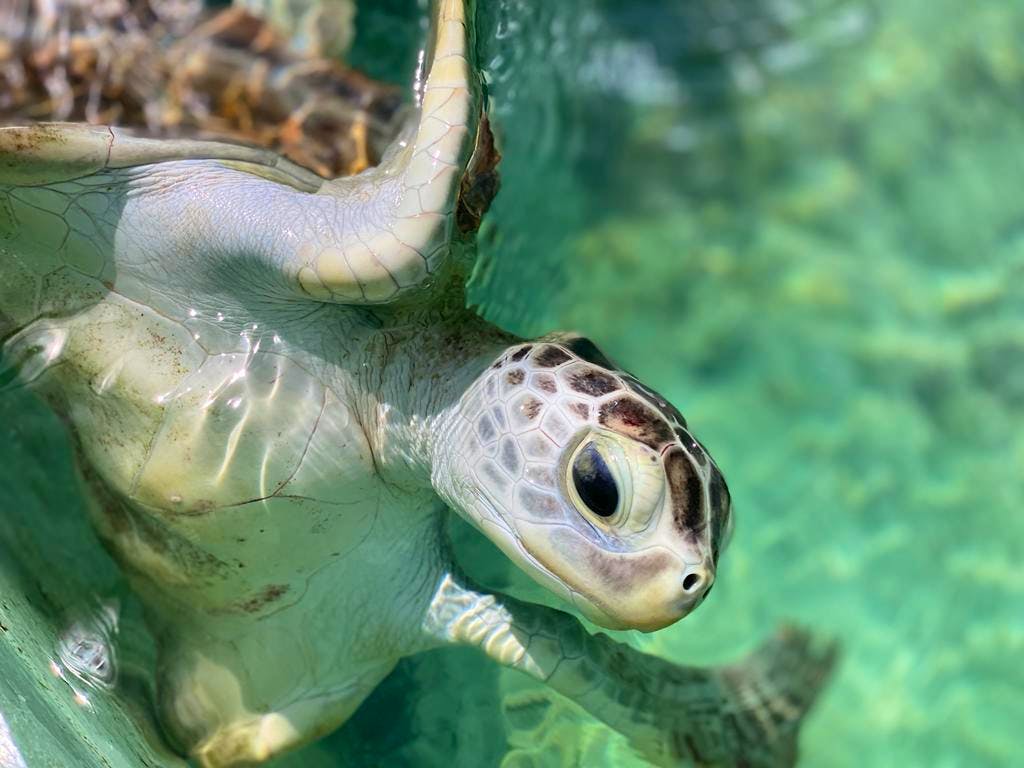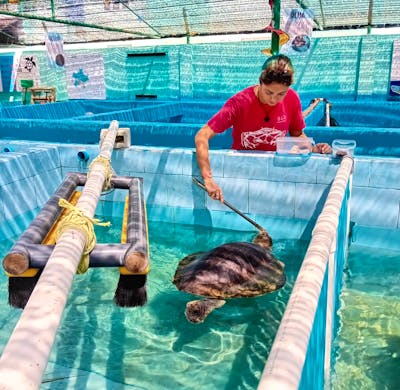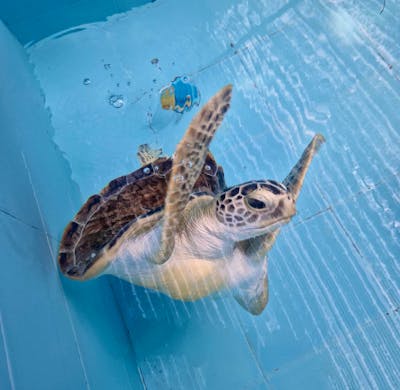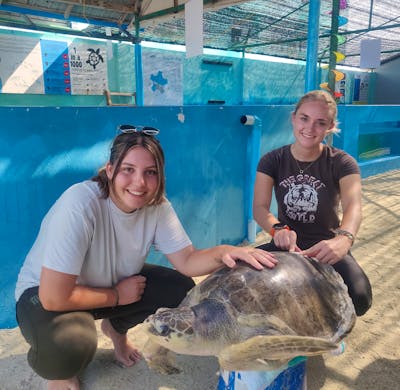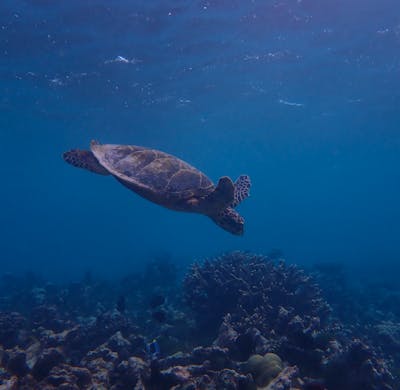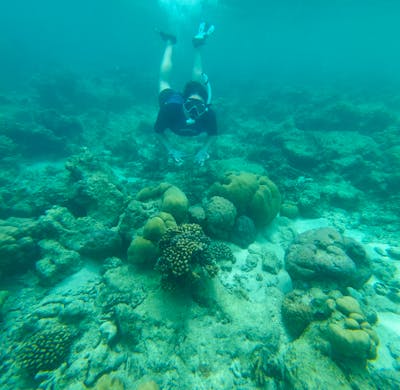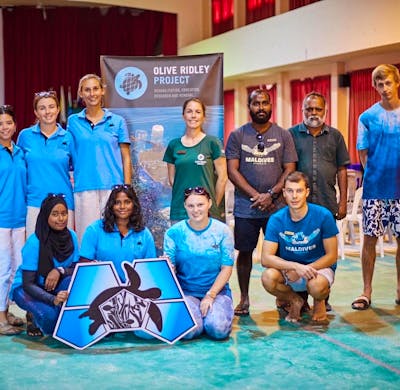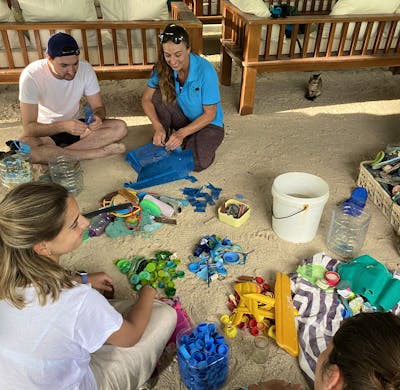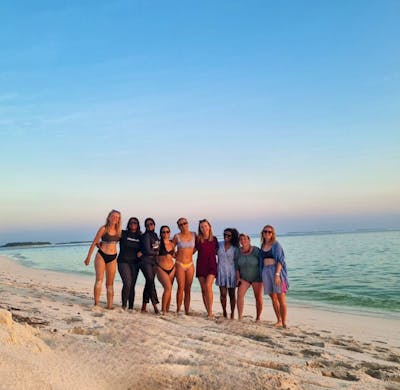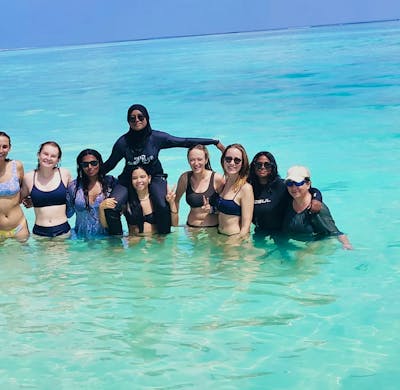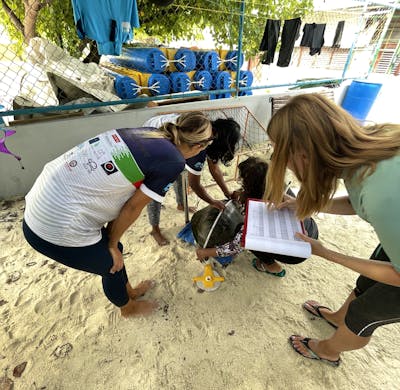This program is a great chance to get involved in marine conservation and work closely with sea turtles. Sea turtles are brought to the marine centre after being kept as pets, or rescued from the ocean where they get trapped in ghost nets. Here, they are rehabilitated and kept in the centre until they are ready to be released, with some of our patients being permanent residents as they are sadly nonreleasable. The program is run by our resident Marine Biologists, allowing you to learn from and work with other ocean enthusiasts..
Volunteer Tasks
Volunteers will work closely with our resident marine biologists. Daily tasks are varied and may include:
- Cleaning and feeding the rescued turtles
- Cleaning the tanks
- Collect seagrass for our resident green sea turtle
- Educating and communicating about your role and the importance of marine conservation with visiting resort guests
- Taking our resident turtle on rehabilitation ocean swims (weather permitting)
- Organising beach cleans/marine awareness sessions
- Performing beach surveys
- Creating decorations and painting our marine centre
- Performing fish surveys
NAIFARU
A LOCAL ISLAND IN
LHAVIYANI ATOLL
Our welcoming island of Naifaru is
located in Lhaviyani Atoll in the
Northern Maldives. The island lies
approximately 142 kilometres (88
miles) north of Malé and is
approximately 53 hectares (0.53 km²),
which includes an area recently
reclaimed.
Being the fifth most populated island in
the Maldives, Naifaru is a bustling little
community, spotted with stores selling
everything from hardware to tailoring
services. There is a post office and a
bank (with an ATM) at your disposal, as
well as a number of restaurants and
coffee shops. Naifaru has just over
5,000 people currently residing on the
island, with the majority being
Maldivian, however there are also a
small number of expatriate workers
from countries such as Bangladesh,
Nepal and Pakistan.
Naifaru has a few main streets which
form a grid, where you will find a maze
of intricate side streets and alleys. Both
the main streets and side streets are
always filled with people of all ages,
sitting around talking, playing local card
games or even playing Maldivian music
in the street. Naifaru is a safe island full
of friendly people, a great place to
make new friends and meet new faces.
Given the relatively small size of the
island, everything is within easy reach.
From the volunteer house you can walk
to any of our projects in less than ten
minutes. Or you might walk down to
one of the island’s four restaurants and
enjoy the warm evening breeze with a
cup of coffee and a view of the Indian
Ocean.
SHOPS
There are many small shops spread across
the island. They sell all the basic goods you
will need in your everyday life in Naifaru.
These shops act as hot spots for the latest
gossip on the island and you will often find
people hanging around shops exchanging
news. Apart from the small stores on the
island, the main street also has a number of
clothes shops and tailors where you can buy
clothes. Bear in mind that their selection is
somewhat limited compared to Western
standards. There are few specialist stores on
the island and if you require something not
considered “general goods”, you might have a
hard time finding it here. Shops also close
multiple times a day for prayer, so bear this in
mind when planning your shopping trips.
Typical opening times are (approximately):
08:00 - 12:00; 13:30 - 15:00; 16:30 - 18:00; 20:30 - 23:00
TRANSPORTATION
Transportation in Naifaru is
usually done by foot or bike.
The island is small and
everything can be reached
within ten minutes by foot.
As such, there are less than
a handful of cars on the
island and no public
transportation. Ferries and
speedboats are considered
to be the “buses” of the
Maldives and there are
several departures during the
day to nearby islands should
you wish to explore in your
spare time (please discuss
with us beforehand).
RESTAURANTS
Maldivians love to
spend time at cafés
and restaurants and
you will find that
there are a
surprising number
of restaurants in
Naifaru despite the
size of the island!
The restaurants
mostly serve dishes
native to South Asia:
rice, curries, noodles
etc. Most of the
food here is spicy
but ask the waiter
and they are happy
to go easy on the
chilli!
DRINKING WATER
Most of the fresh water used for
cleaning, showering and cooking is
desalinated water. However, the local
residents collect rainwater which is
used for drinking. You should not be
concerned about drinking the local
water, but if you are, bottled water is
cheap and readily available in most
stores.
BANK/ATM
There is a branch of the Bank of
Maldives in Naifaru and they are open
on all weekdays (Sunday –
Thursday). The bank also has an
ATM, so it is possible to take out
cash using a bank card (for a fee of
approx. $5). American dollars are
accepted or easily exchanged, $10
and $20 bills are easiest to exchange.
We recommend that you arrive in the
Maldives with at least US$60 which
can be exchanged anytime, used in
an emergency or in case the ATM is
not working.
HOSPITAL
The Lhaviyani Atoll Hospital is based in
Naifaru and always has doctors on
duty. We are happy to assist you in
seeking medical care if needed, but
please note that do not cover
healthcare as part of our volunteering
programs. Having good travel and
health insurance is therefore highly
recommended and will be your own
responsibility!
PHARMACY
There is a well-equipped pharmacy on
the island right next to the hospital
which will cater to your basic needs.
However, if you have any special
condition for which you may need
medication, please let us know in
advance and we can contact the
pharmacy and make sure they have it in
stock.
POLICE AND FIRE
SERVICES
There is a very low
crime rate in Naifaru
and our volunteers have
rarely experienced theft
and never violence.
There is a fire station
and engine on the
island in case of any
emergencies.
The police station is
only a few minutes
from the volunteer
house.
RELIGION
Religion is very important to the
people of Naifaru, where Islam
is followed very strictly. Five
times a day you will be able to
hear the call to prayer (adhan)
from the mosques, which can
be a surreal and beautiful thing
to hear as you explore the
island. Many of the women on
the island wear varying levels
of hijab and when prayer is
called, everything closes,
including shops.
Due to the religion, there are
also certain restrictions which
must be respected by
volunteers. This is especially
important in Naifaru, where
exposure to tourists is much
less than other local islands
and there is no bikini beach.
- It is illegal to possess
alcohol, pork or any
religious material besides
Islam on local islands
- Women must dress
conservatively, even while
swimming - this means
shoulders, thighs and belly
must be covered with
ideally baggy clothes at all
times. Exceptions to this
are on excursions, where
volunteers can wear a
bikini to snorkel or explore
uninhabited islands
- It is seen as disrespectful
for women to smoke in
public, so please be
discrete if doing so
A PARADISE WITH
PROBLEMS
Even though it may have bright turquoise
waters and white sand beaches, volunteers
must understand that Naifaru is not a resort.
Local island life is very different and reflects
the huge wealth disparity in the Maldives.
In Naifaru, many issues have arisen as a
consequence of this disparity. For example,
living conditions can be basic and the island's
waste management is very poor. As a result,
there is a large amount of litter on the island,
as well as incomplete construction projects
where money has ran out. There are also a
large number of stray cats around the island
which many locals view as pests.
This is ultimately why our NGO's
work is so important. We also
work closely with the community
in many areas to educate,
support and campaign for a
better Naifaru.
Whether it's improving sports
facilities, hosting beach clean
ups or protecting the marine
environment, our work all
contributes to a happier and
more thriving community!
Code of conduct
- Show respect to the staff team including founders, marine biologists, vets,
volunteer coordinator, marine biology interns and listen to their instructions
- Show respect to locals and visitors on the island and do not engage in
discrimination or racism
- Engage in tasks required of me across all programs to the best of my ability,
using diligence and initiative
- Understand that the team must assess my swimming ability. If this is deemed
too low, I understand that I may not be able to participate in some group
activities such as boat snorkelling for my own safety
- Always take a buddy when I go snorkelling and inform a member of staff if I am
doing so
- Speak to the volunteer coordinator or member of staff if I have any issues with
anything out of my comfort zone
- Dress conservatively when in Naifaru and other local islands. If identifying as a
woman, this includes avoiding tight fitting or sheer clothes and covering thighs,
belly and shoulders when in public
- (If a smoker) be discrete when smoking
- Not feed stray cats in the centre or bring cats to the centre, and under no
circumstances will I bring cats into the volunteer house
- Understand that locals are prohibited from entering the volunteer house
- Try my best to save resources and power when leaving volunteer house,
including switching air-conditioning, fans and lights off.
- Give permission for Atoll Volunteers, Atoll Marine Centre
and Naifaru Juvenile to use images of myself for
marketing and social media purposes
HEALTH &
SAFETY
ADVICE
Here at Atoll Volunteers, we run a zero
discrimination policy and are always
happy to welcome everyone who is
willing to get stuck in and help.
However, we all have different levels of
ability, fitness and health; with some of
us being better at certain tasks than
others. Therefore, it is important to
understand the challenges you might
face whilst volunteering with us, so that
you can make an informed decision on
whether the program is right for you.
PHYSICAL ACTIVITY
Our program can be very physically
demanding. From scrubbing tanks
and lifting 30kg turtles, to simply
getting on and off the boat whilst
snorkelling. Therefore, it is important
that you have a good level of fitness.
Husbandry work at the centre is a
work-out in it's self, but even the
excursions on our day off can be
tiring. We will often go snorkelling on
excursions where you can see many
amazing things. However, a full days
swimming, sometimes against the
current, can be hard work. You will
also need to be able to get yourself
back on the boat; sometimes, the
vessel does not have a ladder, so a
good level of strength is needed to
lift yourself aboard.
WEATHER
The weather here can be incredibly hot!
Despite being surrounded by ocean,
there is very rarely a sea breeze. The
heat, the humidity and no breeze can be
difficult to manage even if you were just
sat on a beach all day. The work at the
Atoll Marine Centre can be strenuous.
Every day usually consists of scrubbing
tanks or walking the beach to do a beach
clean. Doing this under the Maldivian sun
can be hard work. If you do not look after
yourself, you put yourself at risk of sun
stroke and dehydration. A hat, sun
cream, LOTS of water, taking breaks and
not pushing yourself too hard are all
essential to keeping healthy. We will
always put the health and safety of our
volunteers first but please be aware of
the difficulties of this work. What you are
capable of at home is likely very different
to what you can manage in the tropics.
SNORKELLING
Snorkelling is one of the main
activities we will be doing during your
stay here. Please make sure you are
fully prepared for this, as nonconfident snorkellers may miss out on
activities.
SAFETY
- Prior to arrival, volunteers must
have a strong swimming ability
and be comfortable in open water -
the currents in the Maldives can be
strong, so this is essential
- Please advise us of any preexisting medical conditions such
as asthma or heart problems
- Before snorkelling on the island,
always let one of the team know
where you are going
- Always go in pairs - never alone!
PLEASE DO
NOT BRING A
FULL-FACE
SNORKEL
MASK!
These masks are actually
dangerous and are more likely
to make you panic if you are
new to snorkelling. Please
bring a traditional type instead!
Packing List
TRAVEL DOCUMENTS
- Passport
- Travel insurance
- Health insurance
- Emergency Contact Info
- Information of medical concerns or ailments
- Credit/debit/travel cards for use at island ATM (which
has a fee of 100 MVR)
- USD cash (for exchanging for Rufiyaa if preferred)
- Flight Tickets
GENERAL
- Reusable water bottle (minimum 600ml)
- Towel (shower + beach)
- UK type 3 pin adapter, 220V and cords
- Mask, snorkel and fins (good quality). These are NOT
available for purchase on Naifaru
- Tempered glass mask recommended
- Dry Bag + Beach bag
- Phone, headphones
- Ear plugs, eye mask
- Personal entertainment: kindle, cards, speaker, etc.
- Waterproof camera and/or underwater housing
(recommended)
- Waterproof watch (recommended)
- Any snacks, vitamins, protein powder etc. you may need.
Must be unopened. Especially recommended for
vegetarians, GF and vegans
- Laptop, charger, USB, microSD etc.
- For coffee lovers: there is only instant coffee on island.
BYO travel French press and grinds if you want the good
stuff!
TOILETRIES
- Mosquito repellent- - bring LOTS!
- REEF SAFE sunscreen, zinc, lip screen
- Soap, shampoo, conditioner
- Toothbrush + toothpaste
- Feminine hygiene: menstrual cup/pads/sanitary
underwear/ tampons (tampons are NOT available on the
island)
- Hairbrush, comb, hair ties, tweezers, nail clippers etc.
- Aloe vera or other to soothe burns
CLOTHING
There is a washer and drying rack available. It is best to bring quickdrying, UV protected and breathable material. Bring clothes you
don't mind getting wet or dirty and that respect the modest culture;
women must cover their shoulders, knees and everything in
between when around locals, even while swimming. However,
bikinis can often be worn whilst we are on excursion off island.
- Shirts, short-sleeve, long-sleeve. No sheer or see through
materials. White t-shirts are see through when wet and
cannot be worn while swimming.
- Loose, comfortable pants for dinners, to wear around
town.
Leggings or long shorts for swimming and cleaning in
the centre (knee length or longer)
- Lightweight rain jacket. (Monsoon season runs May-Oct)
- Underwear
Socks (only needed if you plan on exercising)
- Sturdy sandals or flip flops. Shoes you can wear in the
water are a good idea like crocs.
- Sunglasses (UV filter or polarised are a good option)
- Hat (cap or wide brimmed)
- Swimwear (bikinis for excursion, leggings and rash
guards for swimming on Naifaru)
- Nice clothes (always a good idea to bring a nice outfit
just in case)
PERSONAL FIRST AID
While there is a hospital and pharmacy on the island should you
need them, it is a good idea to bring a few items to self-medicate at
home.
- Medication e.g. paracetamol, ibuprofen, supplements,
vitamins, personal ailment medication
- Imodium or anti-diarrhoea tablets
- Rehydration salts
- Anti-histamines
- Anti-septic cream
- Band aids (good quality, waterproof)
- Small bandage wrap and tape
Donations
As an NGO on a remote island, we often find it challenging to get hold of supplies. If
possible, we therefore kindly ask our volunteers to bring donations when you come to
stay with us, particularly for our veterinary clinic. We would be grateful for any
donations you are able to bring, no matter how small!
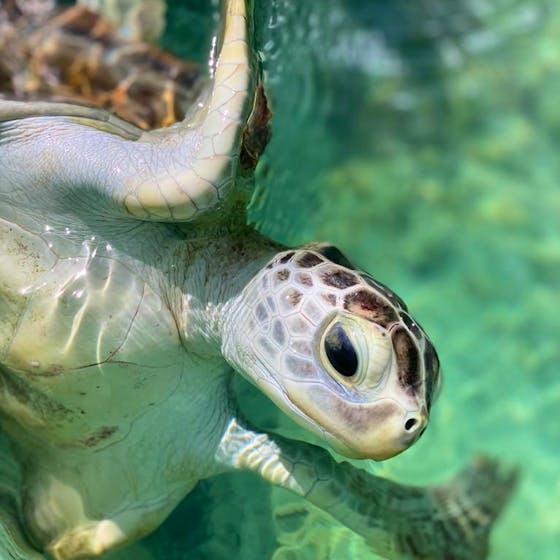




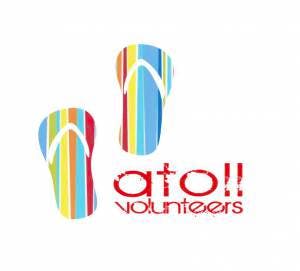
 4.5
4.5

